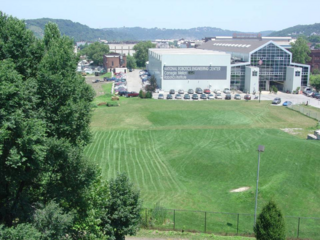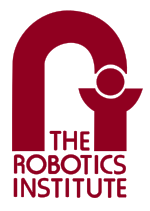
Carnegie Mellon University (CMU) is a private research university in Pittsburgh, Pennsylvania. The institution was established in 1900 by Andrew Carnegie as the Carnegie Technical Schools. In 1912, it became the Carnegie Institute of Technology and began granting four-year degrees. In 1967, it became Carnegie Mellon University through its merger with the Mellon Institute of Industrial Research, founded in 1913 by Andrew Mellon and Richard B. Mellon and formerly a part of the University of Pittsburgh.

The School of Computer Science (SCS) at Carnegie Mellon University in Pittsburgh, Pennsylvania, US is a school for computer science established in 1988. It has been consistently ranked among the top computer science programs over the decades. As of 2022 U.S. News & World Report ranks the graduate program as tied for second with Stanford University and University of California, Berkeley. It is ranked second in the United States on Computer Science Open Rankings, which combines scores from multiple independent rankings.
The DARPA Grand Challenge is a prize competition for American autonomous vehicles, funded by the Defense Advanced Research Projects Agency, the most prominent research organization of the United States Department of Defense. Congress has authorized DARPA to award cash prizes to further DARPA's mission to sponsor revolutionary, high-payoff research that bridges the gap between fundamental discoveries and military use. The initial DARPA Grand Challenge in 2004 was created to spur the development of technologies needed to create the first fully autonomous ground vehicles capable of completing a substantial off-road course within a limited time. The third event, the DARPA Urban Challenge in 2007, extended the initial Challenge to autonomous operation in a mock urban environment. The 2012 DARPA Robotics Challenge, focused on autonomous emergency-maintenance robots, and new Challenges are still being conceived. The DARPA Subterranean Challenge was tasked with building robotic teams to autonomously map, navigate, and search subterranean environments. Such teams could be useful in exploring hazardous areas and in search and rescue.

Dabbala Rajagopal "Raj" Reddy is an Indian-American computer scientist and a winner of the Turing Award. He is one of the early pioneers of artificial intelligence and has served on the faculty of Stanford and Carnegie Mellon for over 50 years. He was the founding director of the Robotics Institute at Carnegie Mellon University. He was instrumental in helping to create Rajiv Gandhi University of Knowledge Technologies in India, to cater to the educational needs of the low-income, gifted, rural youth. He was the founding chairman of International Institute of Information Technology, Hyderabad. He is the first person of Asian origin to receive the Turing Award, in 1994, known as the Nobel Prize of Computer Science, for his work in the field of artificial intelligence.

Carnegie Mellon Silicon Valley is a degree-granting branch campus of Carnegie Mellon University located in the heart of Silicon Valley in Mountain View, California. It was established in 2002 at the NASA Ames Research Center in Moffett Field.
In the history of artificial intelligence, an AI winter is a period of reduced funding and interest in artificial intelligence research. The field has experienced several hype cycles, followed by disappointment and criticism, followed by funding cuts, followed by renewed interest years or even decades later.

William L. "Red" Whittaker is an American roboticist and research professor of robotics at Carnegie Mellon University. He led Tartan Racing to its first-place victory in the DARPA Grand Challenge (2007) Urban Challenge and brought Carnegie Mellon University the two million dollar prize. Previously, Whittaker also competed in the DARPA Grand Challenge, placing second and third place simultaneously in the Grand Challenge Races.
Ekaterini Panagiotou Sycara is a Greek computer scientist. She is an Edward Fredkin Research Professor of Robotics in the Robotics Institute, School of Computer Science at Carnegie Mellon University internationally known for her research in artificial intelligence, particularly in the fields of negotiation, autonomous agents and multi-agent systems. She directs the Advanced Agent-Robotics Technology Lab at Robotics Institute, Carnegie Mellon University. She also serves as academic advisor for PhD students at both Robotics Institute and Tepper School of Business.

Manuela Maria Veloso is the Head of J.P. Morgan AI Research & Herbert A. Simon University Professor Emeritus in the School of Computer Science at Carnegie Mellon University, where she was previously Head of the Machine Learning Department. She served as president of Association for the Advancement of Artificial Intelligence (AAAI) until 2014, and the co-founder and a Past President of the RoboCup Federation. She is a fellow of AAAI, Institute of Electrical and Electronics Engineers (IEEE), American Association for the Advancement of Science (AAAS), and Association for Computing Machinery (ACM). She is an international expert in artificial intelligence and robotics.
Heung-Yeung "Harry" Shum is a Chinese computer scientist. He was a doctoral student of Raj Reddy. He was the Executive Vice President of Artificial Intelligence & Research at Microsoft. He is known for his research on computer vision and computer graphics, and for the development of the search engine Bing.

Subra Suresh is an Indian-born American engineer, materials scientist, and academic leader. He is currently Professor at Large at Brown University and Vannevar Bush Professor of Engineering Emeritus at the Massachusetts Institute of Technology (MIT). He was Dean of the School of Engineering at MIT from 2007 to 2010 before being appointed as Director of the National Science Foundation (NSF) by Barack Obama, where he served from 2010 to 2013. He was the president of Carnegie Mellon University (CMU) from 2013 to 2017. Between 2018 and 2022, he was the fourth President of Singapore's Nanyang Technological University (NTU), where he was also the inaugural Distinguished University Professor.
Almost Human: Making Robots Think is a book written by Lee Gutkind founder of Creative Nonfiction. Gutkind spent six years as a "fly on the wall" researcher at the Robotics Institute at Carnegie-Mellon University in Pittsburgh. He observed scientists and students working to design, build, and test robots so advanced that they will one day be able to work alongside or, in some cases, even replace humans. Almost Human is an intense portrait of the robotic subculture and the challenging quest for robot autonomy. Almost Human is 330 pages long and is published by W.W. Norton. In May 2007 Gutkind appeared as a guest author on The Daily Show with Jon Stewart to talk about robots, the future, and his book.
Navlab is a series of autonomous and semi-autonomous vehicles developed by teams from The Robotics Institute at the School of Computer Science, Carnegie Mellon University. Later models were produced under a new department created specifically for the research called "The Carnegie Mellon University Navigation Laboratory". Navlab 5 notably steered itself almost all the way from Pittsburgh to San Diego.
The Learning Applied to Ground Vehicles (LAGR) program, which ran from 2004 until 2008, had the goal of accelerating progress in autonomous, perception-based, off-road navigation in robotic unmanned ground vehicles (UGVs). LAGR was funded by DARPA, a research agency of the United States Department of Defense.

The National Robotics Engineering Center (NREC) is an operating unit within the Robotics Institute (RI) of Carnegie Mellon University. NREC works closely with government and industry clients to apply robotic technologies to real-world processes and products, including unmanned vehicle and platform design, autonomy, sensing and image processing, machine learning, manipulation, and human–robot interaction.
Jessica K. Hodgins is an American roboticist and researcher who is a professor at Carnegie Mellon's Robotics Institute and School of Computer Science. Hodgins is currently also Research Director at the Facebook AI Research lab in Pittsburgh next to Carnegie Mellon. She was elected the president of ACM SIGGRAPH in 2017. Until 2016, she was Vice President of Research at Disney Research and was the Director of the Disney Research labs in Pittsburgh and Los Angeles.

Argo AI LLC was an autonomous driving technology company headquartered in Pittsburgh, Pennsylvania. The company was co-founded in 2016 by Bryan Salesky and Peter Rander, veterans of the Google and Uber automated driving programs. Argo AI was an independent company that built software, hardware, maps, and cloud-support infrastructure to power self-driving vehicles. Argo was mostly backed by Ford Motor Co. (2017) and the Volkswagen Group (2020).
Ragunathan "Raj" Rajkumar is the George Westinghouse Professor of Electrical and Computer Engineering at Carnegie Mellon University in Pittsburgh, Pennsylvania. He is also affiliated with the Robotics Institute and the Heinz School of Information Systems and Public Policy at Carnegie Mellon University. He also serves as the Director of the Metro21 Smart Cities Institute and as the Director of the Mobility21 USDOT National University Transportation Center at Carnegie Mellon University. He also leads the General Motors-CMU Connected and Autonomous Driving Collaborative Research Laboratory (CAD-CRL), and the Real-Time and Multimedia Systems Lab (RTML) there.

Chris Urmson is a Canadian engineer, academic, and entrepreneur known for his work on self-driving car technology. He cofounded Aurora Innovation, a company developing self-driving technology, in 2017 and serves as its CEO. Urmson was instrumental in pioneering and advancing the development of self-driving vehicles since the early 2000s.

Farnam Jahanian is an Iranian-American computer scientist, entrepreneur, and academic. He serves as the 10th president of Carnegie Mellon University.












